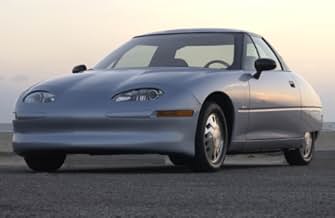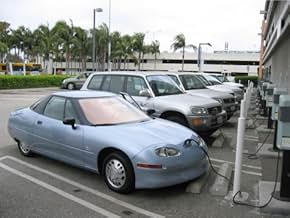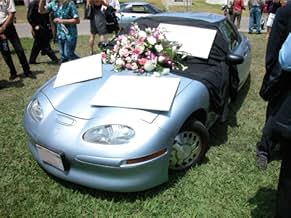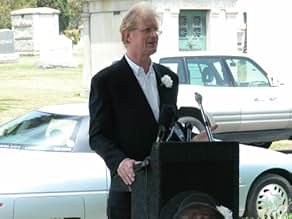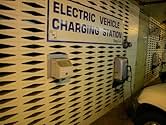Qui a tué la voiture électrique?
Titre original : Who Killed the Electric Car?
- 2006
- Tous publics
- 1h 32min
NOTE IMDb
7,6/10
13 k
MA NOTE
Ajouter une intrigue dans votre langueA documentary that investigates the birth and death of the electric car, as well as the role of renewable energy and sustainable living in the future.A documentary that investigates the birth and death of the electric car, as well as the role of renewable energy and sustainable living in the future.A documentary that investigates the birth and death of the electric car, as well as the role of renewable energy and sustainable living in the future.
- Réalisation
- Scénario
- Casting principal
- Récompenses
- 4 nominations au total
Martin Sheen
- Narrator
- (voix)
Reverend Gadget
- Self
- (as Greg 'Gadget' Abbott)
David Freeman
- Self
- (as S. David Freeman)
Frank Gaffney
- Self
- (as Frank J. Gaffney Jr.)
Avis à la une
10lise-36
Director Chris Paine is no dummy. As a onetime owner of an electric car (the EV1) and a savvy filmmaker, he has quadruple checked his factsand they are alarming. Although the electric car obviously depends upon coal or oil for its power, electricity is far cleaner than gasoline in the long run with less carbon output. Additionally, the batteries are recyclable, and electric cars make fewer demands in other environmental ways: There are no oil changes, oil filters, spark plugs and other parts and services that conventional autos require. Each of these parts carries its own environmental cost.
See this film. It has nothing to do with the current price of gas and everything to do with corruption on many levels.
See this film. It has nothing to do with the current price of gas and everything to do with corruption on many levels.
How can you fit decades of events into two hours? And, not appear to have an agenda? Mr. Paine and his crew did a good job creating a synopsis of the events affecting the Electric Vehicle, and its subsequent effect on us as a society. He also more clearly outlined why we should pay more attention to the EV, and how it played such a key role in the history of our country.
The main thrust of this movie is to educate the public about the actions of key players in shaping our society through their policies on transportation and energy, and how powerful those policies have proved to be in affecting us as a nation. I came away with a better understanding of what I had only guessed at before, and I am very glad that Mr. Paine chose to give the concern-inspiring events first but leave us with a sense of optimism for the future.
The only fault I can find with this movie is that it necessarily has to cover a lot of factual information, something that makes it a lot like reading a good book, rather than viewing a movie. But, if it makes you take a good look at why we're paying over $3/gallon for gas, then it's a good book indeed.
The main thrust of this movie is to educate the public about the actions of key players in shaping our society through their policies on transportation and energy, and how powerful those policies have proved to be in affecting us as a nation. I came away with a better understanding of what I had only guessed at before, and I am very glad that Mr. Paine chose to give the concern-inspiring events first but leave us with a sense of optimism for the future.
The only fault I can find with this movie is that it necessarily has to cover a lot of factual information, something that makes it a lot like reading a good book, rather than viewing a movie. But, if it makes you take a good look at why we're paying over $3/gallon for gas, then it's a good book indeed.
Probably the most alarming thing about this story of how the electric car was literally destroyed is what it reveals about the power of corporations to control our lives. Film maker Chris Paine, himself an EV1 owner, makes it clear that it was big corporations, especially big oil, and most especially General Motors itself, that woke up one day and asked themselves the multi-billion dollar question: Is an economical and efficient electric vehicle really good for business? In the case of the oil companies, obviously not since such a vehicle would not be burning any gas or needing any motor oil. In the case of the car manufacturers themselves, especially GM, which actually spent some very serious bucks on developing the EV1, the answer came as a bit of a surprise. First of all, they asked themselves, in the long run are you going to make more money building small efficient vehicles or behemoths like the Hummer? It didn't take long for them to figure out that the profit margins would be higher with the bigger vehicles. And then they realized that with the EV1 they wouldn't be able to sell many of their combustion-engine parts like oil filters and such. Furthermore, the EV1 was built to comply with California law. Doing some more thinking, GM realized that it would never do to allow some state government to tell them what to manufacture. If things worked out in California, before you know it, the whole nation might very well go plug-in.
So, as shown so vividly in this documentary, the car manufactures and the oil companies bought up or scared enough politicians so that the law requiring zero emissions in California went the way of the dodo. Meanwhile GM, which had been leasing the EV1, recalled them all and literally destroyed them. Paine has some nice footage showing the brand new and near brand new cars being crushed while EV1 lovers protested in vain. Nationally of course we know about the bills congress passed allowing truck-sized vehicles to continue to guzzle gas (mostly SUVs) and how 6,000-pound vehicles were given massive tax breaks for small business owners (mostly anybody but a wage earner).
There is of course plenty of controversy about whether the story presented by Paine (narration by Martin Sheen, by the way) is fair and accurate. I did a little research--there is a ton of information on the Web--and what became obvious after not too long was that the electric car not only is a viable alternative to the combustion engine car but really is the wave of the future whether General Motors and the other car manufacturers know it or not. For now, however, they are not about to change their ways. They have too much of a vested interest in business as it is.
The hydrogen fuel cell red herring is addressed, and, with help from Joseph J. Romm, who wrote The Hype about Hydrogen: Fact and Fiction in the Race to Save the Climate (2004), which I highly recommend, got fed to the dogs. Naturally there is a clip of George W. Bush pretending to support the hydrogen fuel cell car, even though I am sure he knows that economically it's not even close to a match for the electric car. Getting the Great Prevaricator to advance the propaganda put out by the oil and vehicle companies surely is something close to proof positive that it's BS.
Especially watchable is the clip from Huell Howser's PBS show in which we get to see the EV1s not only being crushed but pulverized into little bits for recycling.
So, what's it all about, Alfie? It's just as Eisenhower warned: beware not just of the industrial-military complex taking over our lives, but beware of corporations in general buying up all the politicians and writing all the laws. In fact, with the way the mass electorate is influenced by advertising, only politicians pre-approved through campaign donations from big corporations have a chance of even getting the nomination of either of the two main political parties. And without that nomination, effectively speaking, they can't win.
Regardless of all the machinations by GM, et al., I think our grandchildren will be driving mostly electric vehicles with nary a gas station in sight. And they will be inundated with "green" ads in the media with lots of flowers and little girls paid for by General Motors and Toyota, telling us how they are responsible for the shiny, new clean world.
(Note: Over 500 of my movie reviews are now available in my book "Cut to the Chaise Lounge or I Can't Believe I Swallowed the Remote!" Get it at Amazon!)
So, as shown so vividly in this documentary, the car manufactures and the oil companies bought up or scared enough politicians so that the law requiring zero emissions in California went the way of the dodo. Meanwhile GM, which had been leasing the EV1, recalled them all and literally destroyed them. Paine has some nice footage showing the brand new and near brand new cars being crushed while EV1 lovers protested in vain. Nationally of course we know about the bills congress passed allowing truck-sized vehicles to continue to guzzle gas (mostly SUVs) and how 6,000-pound vehicles were given massive tax breaks for small business owners (mostly anybody but a wage earner).
There is of course plenty of controversy about whether the story presented by Paine (narration by Martin Sheen, by the way) is fair and accurate. I did a little research--there is a ton of information on the Web--and what became obvious after not too long was that the electric car not only is a viable alternative to the combustion engine car but really is the wave of the future whether General Motors and the other car manufacturers know it or not. For now, however, they are not about to change their ways. They have too much of a vested interest in business as it is.
The hydrogen fuel cell red herring is addressed, and, with help from Joseph J. Romm, who wrote The Hype about Hydrogen: Fact and Fiction in the Race to Save the Climate (2004), which I highly recommend, got fed to the dogs. Naturally there is a clip of George W. Bush pretending to support the hydrogen fuel cell car, even though I am sure he knows that economically it's not even close to a match for the electric car. Getting the Great Prevaricator to advance the propaganda put out by the oil and vehicle companies surely is something close to proof positive that it's BS.
Especially watchable is the clip from Huell Howser's PBS show in which we get to see the EV1s not only being crushed but pulverized into little bits for recycling.
So, what's it all about, Alfie? It's just as Eisenhower warned: beware not just of the industrial-military complex taking over our lives, but beware of corporations in general buying up all the politicians and writing all the laws. In fact, with the way the mass electorate is influenced by advertising, only politicians pre-approved through campaign donations from big corporations have a chance of even getting the nomination of either of the two main political parties. And without that nomination, effectively speaking, they can't win.
Regardless of all the machinations by GM, et al., I think our grandchildren will be driving mostly electric vehicles with nary a gas station in sight. And they will be inundated with "green" ads in the media with lots of flowers and little girls paid for by General Motors and Toyota, telling us how they are responsible for the shiny, new clean world.
(Note: Over 500 of my movie reviews are now available in my book "Cut to the Chaise Lounge or I Can't Believe I Swallowed the Remote!" Get it at Amazon!)
As a former engineer with both GM and Ford, I have to thoroughly refute what a previous commenter has stated about likely explanations. With the technology of the powertrain/fuel source development that far along, that far advanced within a viable vehicle, crash-safety and equipment regulations would not have removed this from the marketplace. The "skin" and tub/framework of the vehicle would have been either reworked to comply or the powertrain/fuel source would have been adapted to fit existing car lines that meet crash-safety and equipment regulations. There are plenty of examples of "hurry up" retro-fits in Detroit/Dearborn's history. Unfortunately there is much documented history of technology being quashed, patents being bought and buried, innovations left by the wayside to discourage change, discourage having to retool, reinvent, reinvest...and if you don't think that auto/oil/gov are all complicit in this, how naive can one be? GM and the railroads, the Tucker, fuel injection, Wankel engine, anti-lock brakes...all quashed by powerful companies and people not wanting change no matter what the benefit would be in safety, society, or the environment.
I don't have many documentaries to my credit as far as how many I've watched, but I thought this was great. Part of its appeal was its bringing to light an issue that was either completely unknown to most Americans, or otherwise forgotten. If you consider the parameters surrounding the short lived electric car, then it is easy to see how many of us wouldn't even have known there was a killer of the electric car. Consider that there were few made by GM, Ford, and Honda. Consider that they were only released in California and Arizona. Consider that in those markets not many were sold. And finally, consider that none of the car companies spent much money or effort into advertising these vehicles, then you can see how so many of us were largely ignorant of the plight of the electric car.
This documentary was very informative and fact driven which I appreciate. Sure, politics played some role in it all, but when doesn't politics play a role in major issues? This documentary really be-smudged GM, but since I'm not a GM enthusiast, it didn't bother me one bit. I'd even go so far as to say that this documentary was the only thing that actually made me feel guilty about owning a Hummer. SUV's are my only environmental vice. I recycle, I don't litter, I try to stay away from aerosols, and I generally do what I can... except when it comes to SUV's.
It was interesting to see the active annihilation of the electric car. One can only wonder what the advances in electric vehicles would be if they were to have remain in production. Everyone knows how resourceful and inventive humans can be. Given the right incentive (money), there would probably have been about a dozen upgrades to the electric car and the infrastructure from '96 til now. And to think my home state of California had the chance to be the thorn in the side of the auto industry to effect change but then blinked, only goes to show just how mighty the oil and auto industries are. But I still believe that the electric car will make a second coming. Because if the environment is not enough of an incentive for people to make a change, gas prices certainly will be.
This documentary was very informative and fact driven which I appreciate. Sure, politics played some role in it all, but when doesn't politics play a role in major issues? This documentary really be-smudged GM, but since I'm not a GM enthusiast, it didn't bother me one bit. I'd even go so far as to say that this documentary was the only thing that actually made me feel guilty about owning a Hummer. SUV's are my only environmental vice. I recycle, I don't litter, I try to stay away from aerosols, and I generally do what I can... except when it comes to SUV's.
It was interesting to see the active annihilation of the electric car. One can only wonder what the advances in electric vehicles would be if they were to have remain in production. Everyone knows how resourceful and inventive humans can be. Given the right incentive (money), there would probably have been about a dozen upgrades to the electric car and the infrastructure from '96 til now. And to think my home state of California had the chance to be the thorn in the side of the auto industry to effect change but then blinked, only goes to show just how mighty the oil and auto industries are. But I still believe that the electric car will make a second coming. Because if the environment is not enough of an incentive for people to make a change, gas prices certainly will be.
Le saviez-vous
- AnecdotesThe boxy, small EV shown being crushed in the movie was the Honda EV-Plus. They, like the sleek GM EV-1, were only available for lease; several returned to Honda, and were converted into fuel cell demonstration vehicles. For a while, you were able to lease them through EV Rentals (at several Budget Rent a Car locations).
- Citations
Mel Gibson: Who writes the history? Um, well... The guy with the biggest club.
- Bandes originalesJane's Theme
from Passé virtuel (1999) (as The 13th Floor)
Composed by Harald Kloser
Courtesy of Centropolis Entertainment
Meilleurs choix
Connectez-vous pour évaluer et suivre la liste de favoris afin de recevoir des recommandations personnalisées
- How long is Who Killed the Electric Car??Alimenté par Alexa
Détails
- Date de sortie
- Pays d’origine
- Langue
- Aussi connu sous le nom de
- Who Killed the Electric Car?
- Lieux de tournage
- Sociétés de production
- Voir plus de crédits d'entreprise sur IMDbPro
Box-office
- Budget
- 1 000 000 $US (estimé)
- Montant brut aux États-Unis et au Canada
- 1 678 874 $US
- Week-end de sortie aux États-Unis et au Canada
- 45 138 $US
- 2 juil. 2006
- Montant brut mondial
- 1 764 304 $US
- Durée1 heure 32 minutes
- Couleur
- Mixage
- Rapport de forme
- 1.75 : 1
Contribuer à cette page
Suggérer une modification ou ajouter du contenu manquant

Lacune principale
By what name was Qui a tué la voiture électrique? (2006) officially released in India in English?
Répondre

